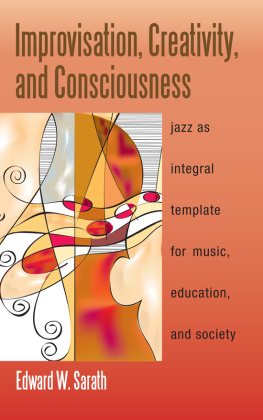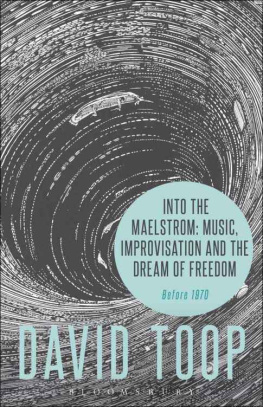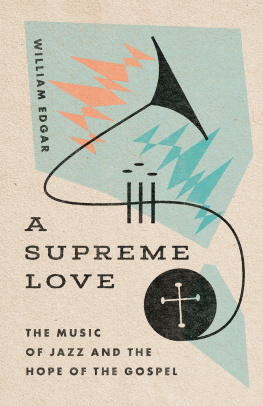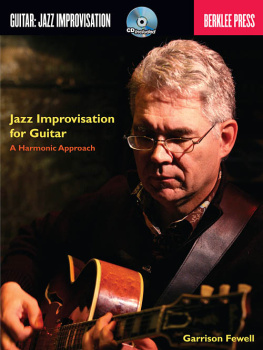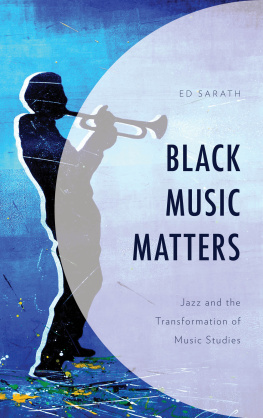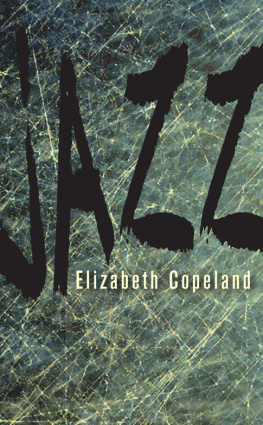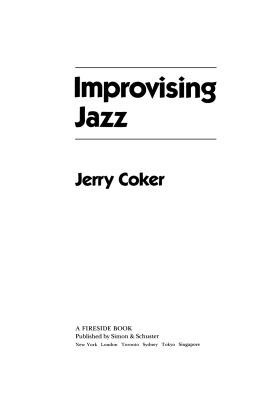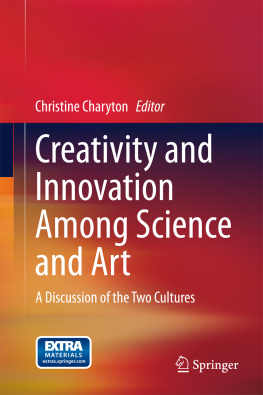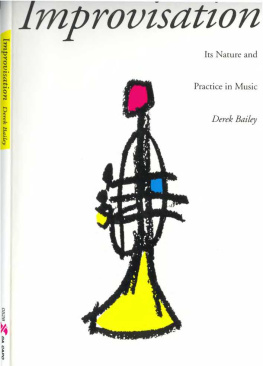SUNY series in Integral Theory

Sean Esbjrn-Hargens, editor
Improvisation, Creativity, and Consciousness
Jazz as Integral Template for Music, Education, and Society
Edward W. Sarath

Cover image Stephen Moore / iStockphoto.com
Published by State University of New York Press, Albany
2013 State University of New York
All rights reserved
Printed in the United States of America
No part of this book may be used or reproduced in any manner whatsoever without written permission. No part of this book may be stored in a retrieval system or transmitted in any form or by any means including electronic, electrostatic, magnetic tape, mechanical, photocopying, recording, or otherwise without the prior permission in writing of the publisher.
For information, contact State University of New York Press, Albany, NY www.sunypress.edu
Production by Diane Ganeles
Marketing by Anne M. Valentine
Library of Congress Cataloging-in-Publication Data
Sarath, Edward.
Improvisation, creativity, and consciousness : jazz as integral template for music, education, and society / Edward W. Sarath.
p. cm. (SUNY series in integral theory)
Includes bibliographical references and index.
ISBN 978-1-4384-4721-6 (hardcover : alk. paper)
1. MusicPsychological aspects. 2. Improvisation (Music) 3. JazzInstruction and study. 4. Interdisciplinary research. 5. Wilber, Ken. I. Title.
ML3838.S19 2013
781.65'11dc23
2012027592
10 9 8 7 6 5 4 3 2 1
Illustrations
Acknowledgments
Inasmuch as it would be impossible to acknowledge all the individuals to whom I owe gratitude, the following list is partial at best. I begin with a big thanks to my colleagues, past and present, in the Department of Jazz and Contemporary Improvisation at the University of Michigan: Geri Allen, Andrew Bishop, Vincent Chandler, Gerald Cleaver, Sean Dobbins, Michael Gould, Marion Hayden, Robert Hurst, Andy Kirschner, Mark Kirschenmann, Bill Lucas, Frank Portolese, Ellen Rowe, Stephen Rush, Martha Travers, Roland Vazquez, and Dennis Wilson, with the fondest memories of my friend, colleague, and ascended jazz master Donald Walden, always close to my heart. Great appreciation goes to Paul Boylan, Dean of Michigan's School of Music for the first half of my tenure there, for creating a climate conducive to asking big questions in a field not always conducive to such, to Professor Donald Sinta for supporting me in those fragile early years, and Senior Vice Provost Lester Monts for his ongoing support and inspiration for a number of projects as well as commitment to diversity and the arts. Special thanks to Richard Mann for being such a great colleague and cohort in bringing consciousness studies to the academy, to Henryk Skolimowski for his inspiring wisdom and support of my work, and to David Liebman for being a great inspiration and mentor throughout my professional career.
All appreciation to everyone who worked with me in launching and sustaining the International Society for Improvised Music, including Douglas Ewert, Mitchell Gordon, Maud Hickey, Betty Anne Younker, Karlton Hester, James Ilgenfritz, Billy Satterwhite, Michael Nickens, Ladonna Smith, India Cook, Jin Hi Kim, Stephen Nachmanovitch, Kate Olson, Bill Johnson, and Sarah Weaver.
Thanks as well go to Terri Adams, Kwasi Ampene, Molly Beauregard, Judith Becker, Dan Barbezat, Phillip Bowman, Mirabai Bush, Marionette Cano, Rui Carvalho, Mark Clague, Richard Crawford, Allan Combs, Nancy Cook, Robert Culver, Diana Denton, Jane Dutton, Shekinah Errington, David Elliott, Jeff Evans, Kaeli Ferguson, Regina Ferguson, Marilyn Fitzpatrick, Robert Forman, Monte Fowler, James Froseth, Kyra Gaunt, Terry Glazer, Elliott Ginsberg, Tracey Goetz, Phillip Goldberg, Freda Herseth, Carol Hutchins, Frank Hueser, Lorin Hollander, Fritz Kaenzig, Paul Kantor, Sharon Kardia, June Katzen, Christopher Kendall, John King, Oliver Lake, Susan King, George Lewis, Joseph Lukasik, David Lynch (the filmmaker), David Lynch (the music promoter), Larry Livingston, Sunanda Markus, John Matlock, Isabelle Matzkin, Andrew Mead, Margaret Mell, Jack Miller, Marie McCarthy, Charlie Miklin, Theo Morrison, David Myers, Martin Mueller, Janne Murto, James Newton, Kate Noble, Eric Nystrom, Pauline Oliveros, Patricia Olynyk, Craig Pearson, Stacey Printon, Jane Pitt, Lenore Pogonowski, Robert Quinn, Guthrie Ramsey, John Rapson, Bennett Reimer, Carlos Rodriquez, Bobby Roth, Sue Shand, Daniel Sher, George Shirley, Stephen Shipps, Henryk Skolimowski, Julie Smigelski, Michael Sternberg, Larry Stevens, Joseph Subbiondo, Richard Tarnas, Fred Travis, Walter Turkenborg, Adam Unsworth, Jeff Vornhagen, Christopher Waterman, Peter Webster, Peter Westbrook, Susan Wilnus, Jackie Wiggins, Michael Wheeler, Paul Willis, Pierre Woods, Reggie Workman, Karen Wolff, Charles Young, and Arthur Zajonc.
To the scores of students who came through my classes through the years, I thank you profoundly and hope that you learned as much from me as I from you. And to those of you who chose to pursue the BFA in Jazz and Contemplative Studies pathway, please know that I will always regard you as among my true heroes.
Thanks to SUNY Integral Theory series editor Sean Esbjrn-Hargens and SUNY senior acquisitions editor Nancy Ellegate for having faith in me and for their help in bringing this book to fruition. Special appreciation goes to Ken Wilber as the predominant contemporary exponent of integral thought. It is almost as if the theory were originally designed for music, even if musical application of it has been so far elusive.
Deepest gratitude goes to his Holiness Maharishi Mahesh Yogi, without whose vision of wholeness and gifts of ways it might be fathomed, very little of this book could have been written. I believe his elucidation of the collective, field aspect of consciousness that unites all of humanity and beyond is among the very most important ideas of our times and I hope this book does justice to it. I have also gained considerably from my encounters with Andrew Cohen, Harry Palmer, Don Alberto Taxo, and Jaggi Vasudev and their spiritual teachings and convey my great appreciation for their gifts.
Finally, my most heartfelt appreciation to my wife Joan Harris, the light and love of my life, for being by my side every moment in this project, arguments about hyphenation and punctuation notwithstanding, and our journey together.
The following chapters are based on material previously published:
: Ed Sarath, Meditation, Creativity, and Consciousness: Charting Future Terrain within Higher Education, Teachers College Record 108, no. 9 (2006): 18161841; and Ed Sarath, Meditation in Higher Education: The Next Wave? Innovative Higher Education 27 (2003): 215234.
: Ed Sarath, A New Look at Improvisation, Journal of Music Theory 40, no. 1 (1996): 139.
: Ed Sarath, Is the Paradigm Shifting Without Us? International Journal of Music Education 25 (1995): 2937; and Ed Sarath, Improvisation and Curriculum Reform, in The New Handbook of Research on Music Teaching and Learning, edited by Richard Colwell and Carol Richardson (New York: Oxford University Press, 2002).
: Ed Sarath, Jazz, Creativity, and Consciousness: Blueprint for Integral Education, in Integral Education: New Directions for Higher Learning, edited by Sean Esbjrn-Hargens, Jonathan Reams, and Olen Gunnlaugson (Albany: State University of New York Press, 2010).
Next page
